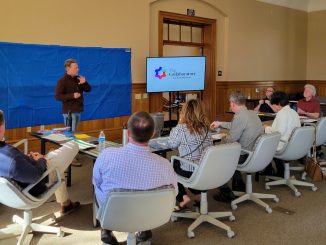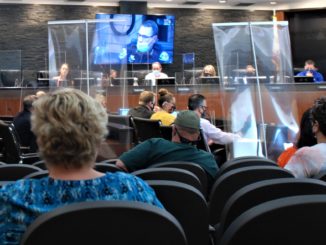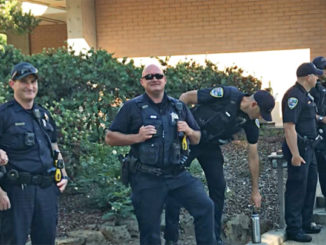
One can only assume sweets shop heiress Kasey Reynolds has never been hungry. Same goes for Sean Morgan, the son of a doctor; Andrew Coolidge, whose father was an attorney; and caterer Deepika Tandon. These four privileged Chico City Council members made that clear when they shot down a motion to discuss so-called community fridges, including the absurdly exorbitant permit fee the city may charge individuals interested in running such mutual aid projects.
You’d think elected leaders wouldn’t be casually dismissive about something as serious as hunger, but their actions at the Feb. 21 council meeting proved otherwise. Indeed, the result may make it more difficult and expensive for Chicoans to help their neighbors fill their bellies. That’s a problem.
In Butte County, chronic food insecurity plagues 14 percent of residents. For context, according to the U.S. Department of Agriculture, the national average is 10.5 percent. Worse yet, 18 percent of local families with children are food insecure. Put another way, roughly one in five kids in this region is regularly hungry. This isn’t exactly news, not to anyone paying attention. It’s precisely why so many local ad hoc groups have sprung up to fill gaps that remain despite federal safety net programs, including the Supplemental Nutrition Assistance Program (aka food stamps); the Special Supplemental Nutrition Program for Women, Infants and Children (WIC); and the National School Lunch Program (free school lunches).
The Chico Community Fridge is one such citizen project. It opened at the height of the pandemic, just over two years ago, in a neighborhood east of downtown. There, people could freely give to and take from the small refrigerator. The appliance has been relocated twice since that time, most recently set up in an alleyway off Hemlock Street. According to the volunteers who help stock and maintain the fridge—including unlocking and locking it at 8 a.m. and 8 p.m., respectively—it has been a resource for hundreds of people in need.
That hasn’t stopped some folks from complaining to the city about the effort, so now the community fridge is caught up in bureaucratic red tape that may require its organizers to shell out nearly $1,700 for a use permit.
Obviously, the council ought to have a conversation about it, giving the public an opportunity to weigh in, as it has in the past with other outmoded permitting fees. One that comes to mind immediately is how the city books used to call for residents to pay over $1,500 to raise chickens and other fowl.
Interestingly, community fridges have been embraced in many other cities, both on residential properties and through partnerships with private businesses and publicly funded agencies, such as local libraries (e.g., Des Moines, Iowa). In fact, such projects are basically the food equivalent of the “little free libraries” in front of so many homes in Chico.
I personally don’t have a problem with the city requiring fridge operators to go through a permitting process, but making it prohibitively expensive for something that provides a community benefit is not a good look. That goes for the city generally, but especially so for the four aforementioned city leaders.
Who looks the worst? It would’ve been a toss-up, but Vice Mayor Reynolds gets the “What were they thinking?” award. Immediately after giving a thumbs down, she attempted to agendize discussion on another permitting issue: to allow the Downtown Chico Business Association to sell alcohol at City Plaza—something prohibited per city code. Evidently, changing the books to allow booze sales in a public park to boost private businesses is acceptable, but making it easier to feed the poor isn’t. That’s nice.
One last point: Reynolds’ ice cream shop is a stone’s throw from City Plaza and would benefit from the DCBA’s event. How is her lobbying for that discussion not a conflict of interest?
Melissa Daugherty is editor-at-large for the Chico News & Review




Be the first to comment